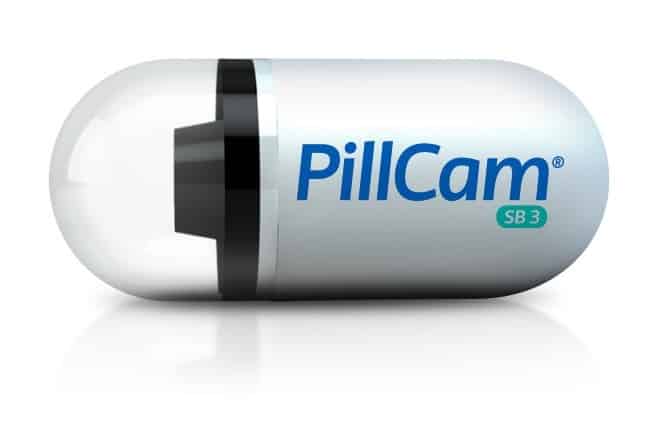Sussex Premier Health, Hastings: Important update for patients with upcoming appointments
Sussex Premier Health, Hastings: Important update for patients with upcoming appointments
A Capsule Endoscopy involves swallowing a small, ingestible capsule that lets your doctor visualize your entire small bowel. The PillCam™ SB3 capsule contains a tiny camera and light source that takes images of your small intestine as it travels naturally through your digestive tract.
If you or a loved one suffers from gastrointestinal (GI) bleeding, Crohn’s disease, or iron deficiency anemia, your doctor may need to see inside your small bowel to evaluate your condition.
With Capsule Endoscopy, this is done in an non-invasive way with an ingestible capsule, the size of a vitamin.

A Capsule endoscopy is a minimally invasive procedure that involves a small, swallowable capsule that contains a tiny camera. The PillCam™ SB3 capsule, about the size of a large pill, contains a light source that takes images of your small intestine as it travels naturally through your digestive tract. It captures high-quality images of the esophagus, stomach and small intestine, or the colon. These images are transmitted to a recording device worn by the patient and later reviewed by a healthcare professional.
Advantages of the Capsule Endoscopy are:
There could be a number of reasons you are recommended a Capsule Endoscopy, including:
Having had a consultation and been assessed to be suitable for the procedure, the preparation for the capsule endoscopy involves starving from midnight prior to the procedure.
Sometimes a bowel cleansing solution is given the night before and on the morning of the capsule. In order to do the capsule endoscopy, a belt that contans sensors is worn around the abdomen which connects to a data recorder to receive the information that is transmitted by the capsule as it passes through the bowel. This is worn for the duration of the test.
Once the capsule is swallowed with a glass of water, you are generally free to leave for the day. The belt should remain on for 8-9 hours and can then be removed.
In this style of procedure, the capsule itself does not need to be retrieved and is passed into the toilet in time.
The data recorder and belt can are returned the evening of the procedure or the next day for analysis.
During the procedure, you should not eat or drink for 2 hours after the capsule has been ingested. After 2 hours, you can drink still liquids (no carbonated (fizzy)) and food and medicines can be eaten 4 hours after the capsule has been ingested.
Once the data recorder and belt have been handed back, Dr Mayhead will analyse the results and write a report. You will be contacted with the results and advised of the next treatment options.
A capsule endoscopy cannot be undertaken in the following circumstances:
The procedure is a safe test and is usually painless. The most likely major complication is retention of the capsule which will be discussed prior to the procedure being undertaken. It is generally related to the presence of a stricture or narrowing of the bowel, that can sometimes be predicted and the test avoided.
A Capsule Endoscopy is £1,775.
This does not include any consultations or diagnostics prior to the procedure.
Speak to a member of our team